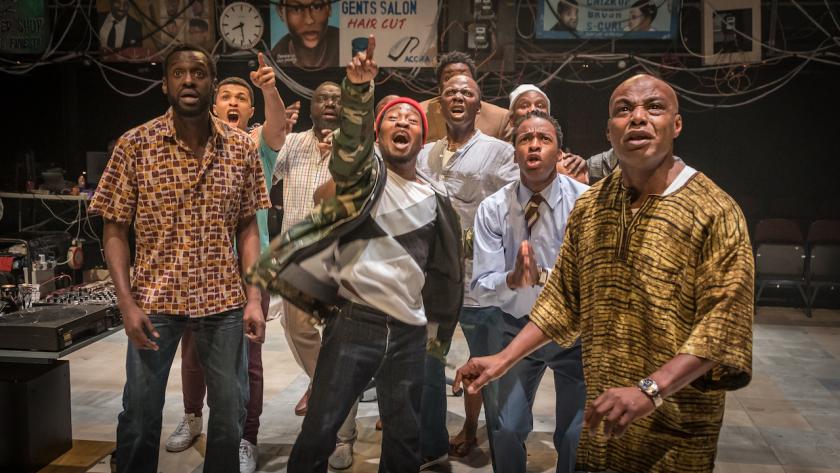Barber shops – as we are all starting to appreciate in this time of lockdown – fulfil an emotional as much as a cosmetic role: having a haircut can represent a new beginning, a moment for reflection, or even an informal confessional. As the hugely successful Barber Shop Chronicles becomes the latest high-profile National Theatre production to be streamed online, audiences are invited to listen to the dreams, confessions and arguments of black men for whom the barber is also a sanctuary.
It’s the playwright himself, Inua Ellams, who describes the barber shop as a “safe, sacred space where [British] black men can go to relax, escape racism and talk freely with no fear of being stopped, questioned or moved on by the police”. To write the play, he went to six different cities – Lagos, Accra, Kampala, Johannesburg and Harare as well as London’s Peckham – to witness the cut and thrust of barbershop banter and the place it occupies in black male identity.
It’s no small irony that Bijan Sheibani’s lively whirlwind of a production kicks off with the performers singing along to Skepta’s grime hit Shutdown. From this kick-ass opening we segue quickly into a scene in which a man called Wallace (Hammed Animashaun) is hammering on a Lagos hairdresser’s door at 6 in the morning shrieking “Help Me. Emergency”.
 The emergency, it transpires, is that he needs a haircut. But the comedy is underscored by the more serious fact that as one of Lagos’s many unemployed (currently Nigeria’s unemployment rate is 23.1 per cent of the work force) he is penniless and desperate to get a job as a driver. When he bolts at the end of his haircut without paying, his story will become one of the many threads of Ellams’ boisterous and provocative narrative. Over the next one hour and forty-five minutes we will see the poor and the affluent, the straightforward and the corrupt, the furious and the easygoing take their seats and reveal the innermost workings of their hearts against the buzz of the clippers.
The emergency, it transpires, is that he needs a haircut. But the comedy is underscored by the more serious fact that as one of Lagos’s many unemployed (currently Nigeria’s unemployment rate is 23.1 per cent of the work force) he is penniless and desperate to get a job as a driver. When he bolts at the end of his haircut without paying, his story will become one of the many threads of Ellams’ boisterous and provocative narrative. Over the next one hour and forty-five minutes we will see the poor and the affluent, the straightforward and the corrupt, the furious and the easygoing take their seats and reveal the innermost workings of their hearts against the buzz of the clippers.
Rae Smith’s fluid design fills the stage with an array of chairs which can be spun quickly into new formations as the production flits from country to country. One moment we are in Nigeria listening to a rant about the divisions between the impoverished North and the wealthy South, the next we are in Uganda talking about the oppression of the gay population. Comedy and tragedy intertwine throughout. At one point a character riffs preposterously on the pros and cons of dating white women as opposed to black women, at another point the discussion revolves around the fact that while the Holocaust killed 6 million, slavery killed 30 million.
As the evening progresses – interspersed with music and dance interludes that include a routine where the dancers wheel around the stage on barber shop chairs – certain threads become more and more prominent. One recurring theme is that of domestic violence, another is the different ways of asserting identity through language (all the African countries featured are anglophone). The central narrative thread is that all the conversations are taking place on the day of a big football match between Barcelona and Chelsea. We eavesdrop on most characters before whirling on, though dramatic tension is stoked throughout by a dispute between Fisayo Akinade’s intense, troubled Samuel and Cyril Nri’s conflicted Emmanuel, Samuel’s employer (Nri is pictured above).
The vibrancy and humanity of this production come through in its online version, though it also makes you hunger to be there in the crowd. The noise and energy of the dance, the staccato irreverence of the banter, that sense of the multiple lives thronging through cities evoke the pre-Covid world all too vividly.
It’s yet another reminder that the compelling articulation of stories is the lifeblood of any culture, and the National Theatre (who co-commissioned this with Fuel) remains - if you'll excuse the pun - on the cutting edge of shaping the narratives of our time. Where William Blake saw a world in a grain of sand, Ellams shows it through several strands of hair, perhaps proving en route that – as a very different writer put it – “Hair is everything”.















Add comment